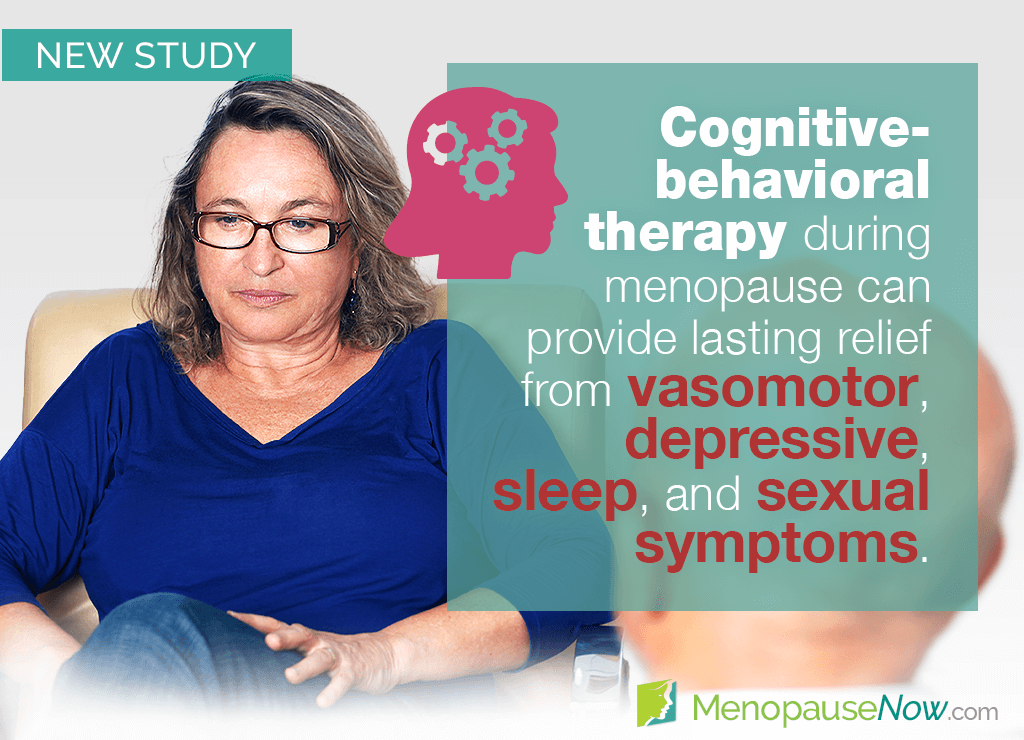Most commonly, middle-aged women undergo cognitive-behavioral therapy (CBT) during menopause to find relief from a variety of emotional difficulties, including anxiety, depression, and others.
In an attempt to study its expanded applications, Canadian researchers took a closer look at the effectiveness of CBT for menopause symptoms, including hot flashes, night sweats, and others.
Study Design
This 2019 randomized controlled trial was done on 71 perimenopausal and postmenopausal women experiencing menopause symptoms. The study lasted for 12 weeks.
After initial assessments, women in the treatment group underwent weekly, 2-hour-long, group CBT sessions, including psychoeducation and cognitive-behavioral strategies for vasomotor symptoms, depression, anxiety, sleep problems, and sexual issues.
Women in the control group did not receive CBT nor other psychological intervention during the 12 weeks.
Before the study, at its end, and three months after its completion, researchers took various assessments using tools such as the Hot Flash Related Daily Interference Scale (HFRDIS), Beck Depression Inventory, the Female Sexual Function Index (FSFI), and others.
Study Findings
After 12 weeks, women receiving CBT sessions showed significantly greater improvements in the severity of vasomotor, depressive, sleep, and sexual symptoms.
Participants in the CBT group rated the intervention as “excellent” (84.6%) or “good” (15.4%), and all would recommend it to other menopausal women struggling with similar symptoms.
These beneficial effects were still maintained after three months at post-treatment check-up.
What Does It Mean?
The results of this clinical trial build on evidence from previous studies, showing that CBT is effective for relieving menopause symptoms, most particularly vasomotor, depressive, sleep and sexual ailments.1,2
This gives menopausal women an option for effective, pharmacology-free treatment for their discomforts and a natural way to improve quality of life.
Researchers encourage primary care providers to recommend CBT as menopause treatment, whenever applicable. They also suggest future studies to evaluate the effects of CBT on menopausal anxiety as their findings were inconclusive.
Sources
- Menopause. (2019). Cognitive behavior therapy for menopausal symptoms (CBT-Meno): a randomized controlled trial. Retrieved November 23, 2020 from https://journals.lww.com/menopausejournal/Abstract/2019/09000/Cognitive_behavior_therapy_for_menopausal_symptoms.6.aspx
Footnotes:
- Mauritas. (2013). Telephone-guided Self-Help Cognitive Behavioural Therapy for Menopausal Symptoms. Retrieved November 23, 2021 from https://pubmed.ncbi.nlm.nih.gov/24144959/
- Psychooncology. (2009). Evaluation of a group cognitive behavioral intervention for women suffering from neopausal symptoms following bread cancer treatment. Retrieved November 23, 2021 from https://pubmed.ncbi.nlm.nih.gov/18646246/

